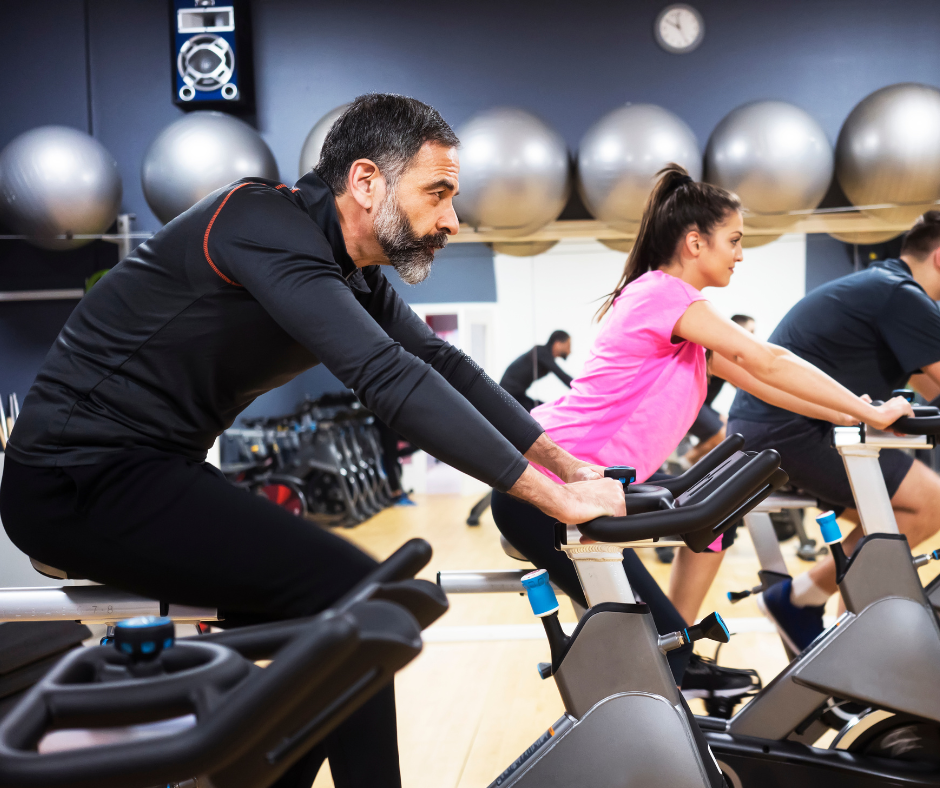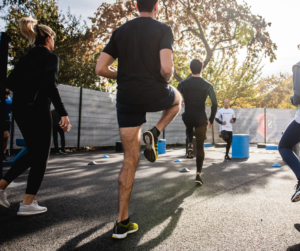The sacred period of 30 days where fasting, reflection, and self-discipline are practiced is known as Ramadan. Those that observe Ramadan are not allowed to consume food or water from sunrise to sunset.
The practice of fasting for Muslim people can result in sleepless nights, a lack of liquids, and low energy levels. This makes it difficult for those who want to maintain their training routines and fitness levels.
To keep energy levels up, and maintain their fitness and their mental well-being, there are a few physical and mental challenges athletes who practice Ramadan need to overcome…
In this article, we are going to have a look at those challenges and best practices to help you overcome those challenges…

Let’s first look at why you should take on these challenges and continue training through Ramadan…
Should You Continue Training During Ramadan?
We highly recommend that you continue to exercise throughout the month of Ramadan. Getting movement in whether it is going for daily walks, swimming, doing yoga, or following a training plan is going to bring you several mental and physical health benefits.
Benefits of training during Ramadan:
- Maintaining physical fitness
- Improving energy levels and concentration
- Reducing stress
- Regulating sleep patterns
- Boosting your immune system
- Enhancing overall health and well-being.
You must take note of how your body is feeling during this time and not overdo it. This isn’t the time to smash goals and challenge yourself. It’s about maintaining your current fitness levels safely and sustainably.
It’s important to listen to your body for these reasons:
- To avoid dehydration
- To prevent injury
- To see if you need to make changes to your training intensity and volume
Let’s have a look at some nutritional challenges you may face and how to overcome them safely…
How To Overcome Nutrition & Hydration Challenges During Ramadan
Common nutritional and hydration challenges athletes training during Ramadan experience are:
- Limited calorie intake during the day
- Dehydration
- Difficulty eating enough and replenishing enough fluids before and after exercise
- Inability to meet increased energy demands
- Inability to recover sufficiently after training sessions
Challenge: Limited calorie intake during the day
Solution: When you do break the fast, consume a small meal first like soup and bread, and then wait a little while, drink water, and then consume your main meal. That way you have spaced out your meals and your energy levels will be maintained better.
What To Do At The Beginning Of Fast:
- Wake up early
- Weigh yourself
- Light exercise in the morning
- Reduce training as much as possible in the afternoon.
- Avoid exposing yourself to sunlight.
- Keep yourself cool during the day by taking showers or going swimming.
- During the training sessions during the day, wear light-colored, loose, and lightweight clothes (fabrics that allow sweat evaporation) and a lightweight cap of a light color.

What To Do When You Break The Fast:
- Weigh yourself before the meal. This will give you an indication of your hydration levels.
- Drink small sips until your stomach is comfortable. Then increase to drink at least the equivalent of the weight you lost during the day.
- Include foods that are rich in water such as milk, smoothie, vegetable juice, and soups.
- Eat small amounts initially and follow up with bigger meal
- Train with carbohydrates and fluids during the session.
- Have a bigger meal after training.
- Limit fatty foods and very sweet food.
- For the main meal, have a lean protein, e.g. skinless chicken, beef, veal, or fish kebab, combined with starchy foods and vegetables.
- Desserts with couscous, fresh and dried fruit
- Avoid stimulants such as coffee, tea, sodas, and energy drinks
Challenge: Dehydration
Solution: Prepare for your day of no liquids by drinking water as often as possible during the night, keep a big bottle of water next to your bed so that when you can, try and drink about a cup at a time.
Pro Tip: Food also plays a huge part in keeping you hydrated. Foods that contain a lot of sugar can dehydrate you while fruit can provide extra hydration.
It is unlikely that mild dehydration associated with Ramadan will negatively affect short-term exercise, i.e. under one hour. This may not be the case during longer-duration events especially if these events take place in high ambient conditions.
Athletes during Ramadan should make increased efforts to ensure that exercise is commenced euhydrated and that rehydration occurs as soon as it is feasibly possible. This is only a problem when exercise is performed before the Iftar meal.
It may also be an option to utilize cold mouthwashes during exercise to help prevent feelings of thirst, however, this again will require discussion with religious authorities. It is important to remember that rehydration should not only be focused on the restoration of fluids but also must consider the specific electrolytes that will be lost especially sodium.
This may involve the addition of electrolytes to fluids especially if athletes have performed prolonged exercise in the heat before the Iftar meal.
Drinking sufficient fluids from Iftar until Suhoor is crucial while taking into consideration the need for additional electrolytes. This can be done either by drinking rehydration solutions or by drinking and eating at the same time. This will help your body to retain water.

It should be noted that it would be unwise to attempt to hyperhydrate by drinking copious amounts of water at the Suhoor meal as this can lead to prompt diuresis and ultimately could contribute to further dehydration.
Athletes can easily determine whether their hydration plan is sufficient to balance their losses by checking body weight, and monitoring the color and amount of urine produced, especially in the morning (urine should be clear and of a normal volume):
Strategies to reduce sweating should be used. For example, avoid senseless exposure to heat or sun. In addition, consider using “cooling vests”, cold baths, fans, etc. during and after the effort, especially if you are performing in a hot atmosphere.
Challenge: Difficulty eating enough before and after exercise:
Solution: Consume slow-releasing high-carbohydrate snacks before your training session if you can. Consume a meal containing carbohydrates and protein within 30 minutes of completing your exercise.
Pro tip: To consume food and liquids before and after your training, the best time to exercise would be early in the morning before sunrise, or after sunset in the evening.
Reserve daytime training for technical, tactical, and light sessions. Do higher intensity sessions or strength sessions closer to or even following the Iftar
Post-training protein feeding results in the most favorable anabolic environment for muscle growth and repair.
Theoretical feeding and training structure:
- Protein distributed throughout the day including immediate post-training (achieving 4 x 0.4g/kg)
- Carbohydrates are to be provided before and after ‘high-intensity sessions (achieving 6-8g/kg),
- Slow-releasing proteins pre-bed and pre-fast to give a more sustained supply of amino acids to facilitate recovery.
Example:
5h00 Final pre-dawn meal (Suhoor)
- Carbohydrate (2 g/kg)
- Protein (0.4 g/kg)
- Yogurt with fruit; toast with egg and grated cheese and fruit juice
6h00
- Slow-release protein (0.4 g/kg), e.g. casein
- Milk, yoghurt (casein)
6h30
- Sunrise
- Beginning of fast
9h00 – 14h00
- Preferable light training sessions
14h00 – 18h00
- Resting preferred
- Nap if possible
19h00 Sunset
- Post-sunset recovery shake containing 1 g/kg carbohydrate and 0.4 g/kg protein to break the fast
- Meal replacement shake, recovery shake, or smoothie with milk/yogurt, fruit, and peanut butter or protein powder
- Follow up with strength or high-intensity training
19h30 – 20h00 Iftar
- Iftar meal containing 4 g/kg carbohydrate and 0.4 g/kg protein
- Chicken, fish, or beef served with rice, legumes, and vegetables. Add fluid to the meal, e.g. drinking yogurt, milk, fruit juice, or cordial.
22h00
- Slow-release protein containing 0.4 g/kg protein with some carbohydrates alongside (1 g/kg body mass)
- Yogurt with fruit and nuts or seeds OR Cereal and milk OR Peanut butter sandwiches with banana and milk.
Challenge: Inability to meet increased energy demands
Solution: Consume enough calories from healthy sources to meet increased energy demands.
Recommended Foods To Eat When Breaking the Fast:
At least one hour before starting training, favor easily digestible food such as
- Cereal bar
- Slice of gingerbread
- Rusk
- Fruit puree
- Plain yogurt
Many common foods associated with Iftar are rich in carbohydrates (e.g. figs/dates) and high-quality protein (milk and laban yogurt).
The substantial meal after prayers typically features savory dishes with carbohydrate-rich components (rice) and protein (meat or fish). Arab breads and other varieties provide worthwhile amounts of carbohydrates.
Other combinations of carbohydrates and protein include Thareed (bread containing), starch pudding (milk), and rice porridge.
Care should be taken with Ramadan treats, since many are very high in fat. Some recipes can be adapted to promote carbohydrate content and reduce fat (e.g. replace puff pastry in Um Ali with bread). Ma’amoul, dried fruits, and nuts are suitable snacks.
When eating opportunities are limited, drinks with high energy/nutrient density can be useful to meet high-energy requirements. These include special nutrient feeds used in clinical nutrition situations, liquid meal supplements, and fruit/milk smoothies
Many of the special Ramadan drinks (e.g. Jellab) are energy-rich and those based on milk/laban also provide high-quality protein
Suhoor meals that are high in carbohydrates include rice with egg, cheese, and milk. Beans and foul while good sources of many nutrients may not be suitable if consumed close to a training session
If you have any hydration or nutrition-related concerns, we have our very own registered dietician – Nicki de Villiers.
She has been working in the field of dietetics for around 20 years and has been concentrating on sports nutrition for the last 14 years and started working at The High-Performance Centre at the University of Pretoria around 10 years ago.
Challenge: Inability to recover sufficiently after training sessions
Solution: Allow adequate time for recovery between sessions, and do cool-down stretches and mobility exercises after your sessions to engage in active recovery techniques.
As we mentioned above, you need to consume an adequate amount of protein and carbs within 30 mins of completing your training session.
Why You Should Drink Chocolate milk!
Now that we have looked at the nutritional and hydration challenges those practicing Ramadan might face, let’s look at the physical and mental difficulties one might encounter and how to overcome them…
Physical & Mental Challenges Of Training During Ramadan & How To Overcome Them
Athletes training during Ramadan might face both physical and mental challenges, including:
Challenge: Fatigue
Solution: Prioritise getting good quality sleep,
How you feel while awake and training depends largely on what happens while you are asleep.
Sleep plays a vital role in your health and your mental & physical well-being. Which contributes to improving your running performance.
SAFE & EFFECTIVE Training During Ramadan: A Comprehensive Guide
Top Tips To Ensure a Good Quality Sleep
- Set a routine bedtime
- Eliminate caffeine later in the day
- Reduce blue light one hour before bed
- Budget more time in bed than needed
- Eat sleep-inducing foods such as magnesium-rich foods (Pro tip: Tart cherry juice will be of help here)
- Use a white noise machine
- Make sure your bedroom is a cool temperature and dark
Read about the importance of sleep here.
Challenge: Decreased energy levels
Solution: Exercise during the non-fasting hours.

The safest time to exercise while you are fasting during Ramadan depends on your personal preference as there are different pros and cons to training at different times of the day depending on your schedule and how your body reacts.
If possible train in the evening after a very small meal, then eat again after training. If you have to train in the morning, do it early so you can hydrate well and eat before Sunrise.
Challenge: Reduced endurance
Solution: This links back to how vital it is to consume nutritious and well-balanced meals.
You can read more about how to fuel your body for your training here: Fueling Your Workouts during Ramadan: A Nutrition Guide
Challenge: Decreased muscle mass
Solution: You need to dial down on the intensity and moderate the volume of your runs and strength sessions.
Starting with lower-intensity and shorter-duration workouts, and gradually building up as the body adapts to the changes of fasting is what we recommend and this should prevent a decrease in muscle mass if paired with a highly nutritious diet.
The most important thing to remember is that not everyone will react the same to their fasting and that’s why you need to start at a low intensity and see how your body reacts.
Challenge: Lack of motivation
Solution: Set realistic and achievable goals. This will give you a sense of purpose and direction when working out. Mix up your routine. Try new exercises or activities to keep things interesting and avoid boredom.
Challenge: Decreased focus
Solution: Getting a good quality night’s sleep will help you feel more alert and focused throughout the day. Make sure you are keeping hydrated when possible because dehydration decreases concentration and try to practice mindfulness and meditation in whatever way feels comfortable for you, doing this will improve your concentration by relieving anxiety.
Challenge: Increased stress levels
Solution: Focus on how you feel after exercising or going for a run. Exercise can help relieve stress and improve mood, so remind yourself of these benefits and embrace them.
It’s important to remember that every individual is unique, and what works for one person may not work for another. It’s vital to listen to your body and adjust your training, nutrition, and hydration strategies accordingly.



Comments are closed.